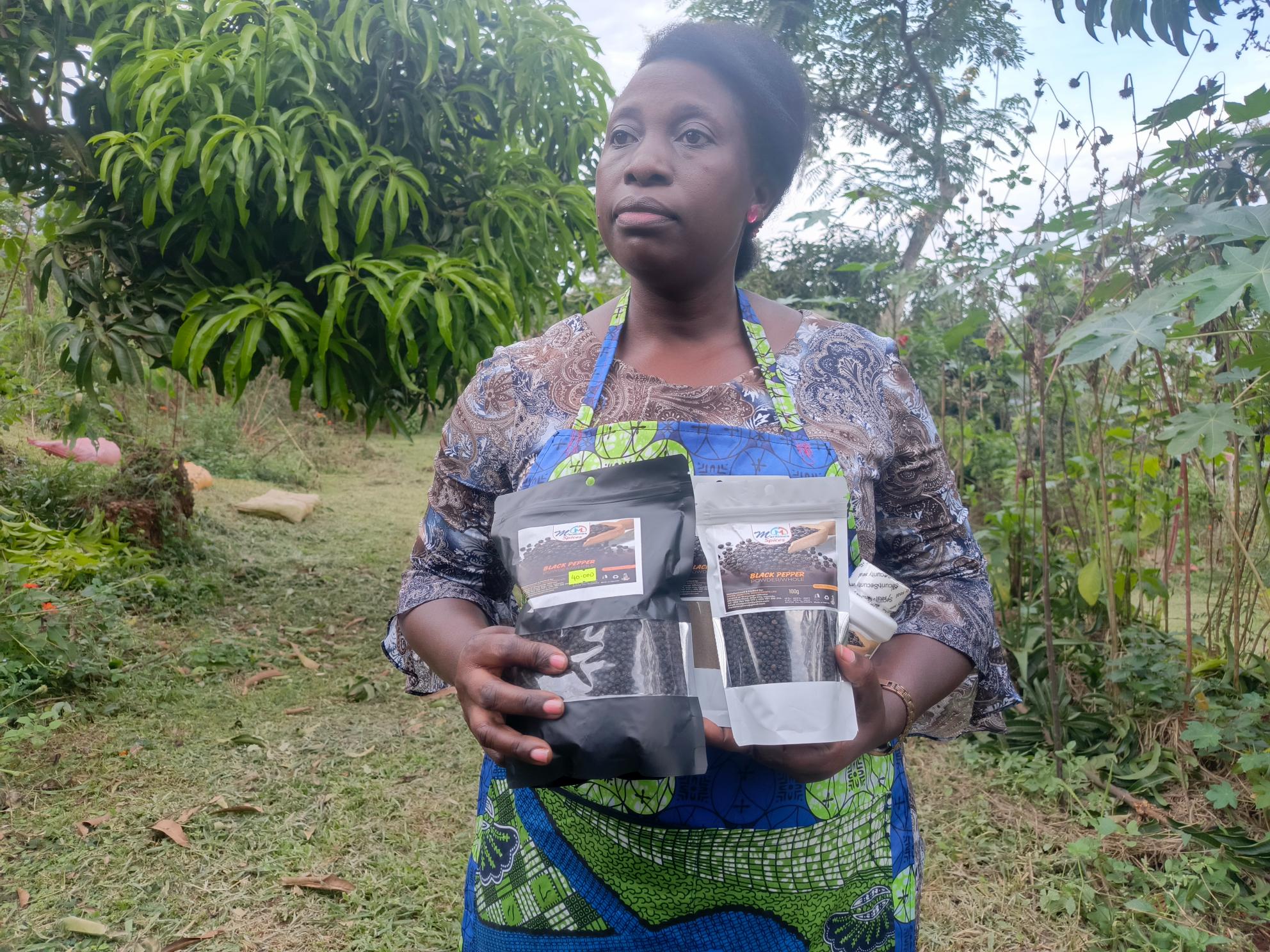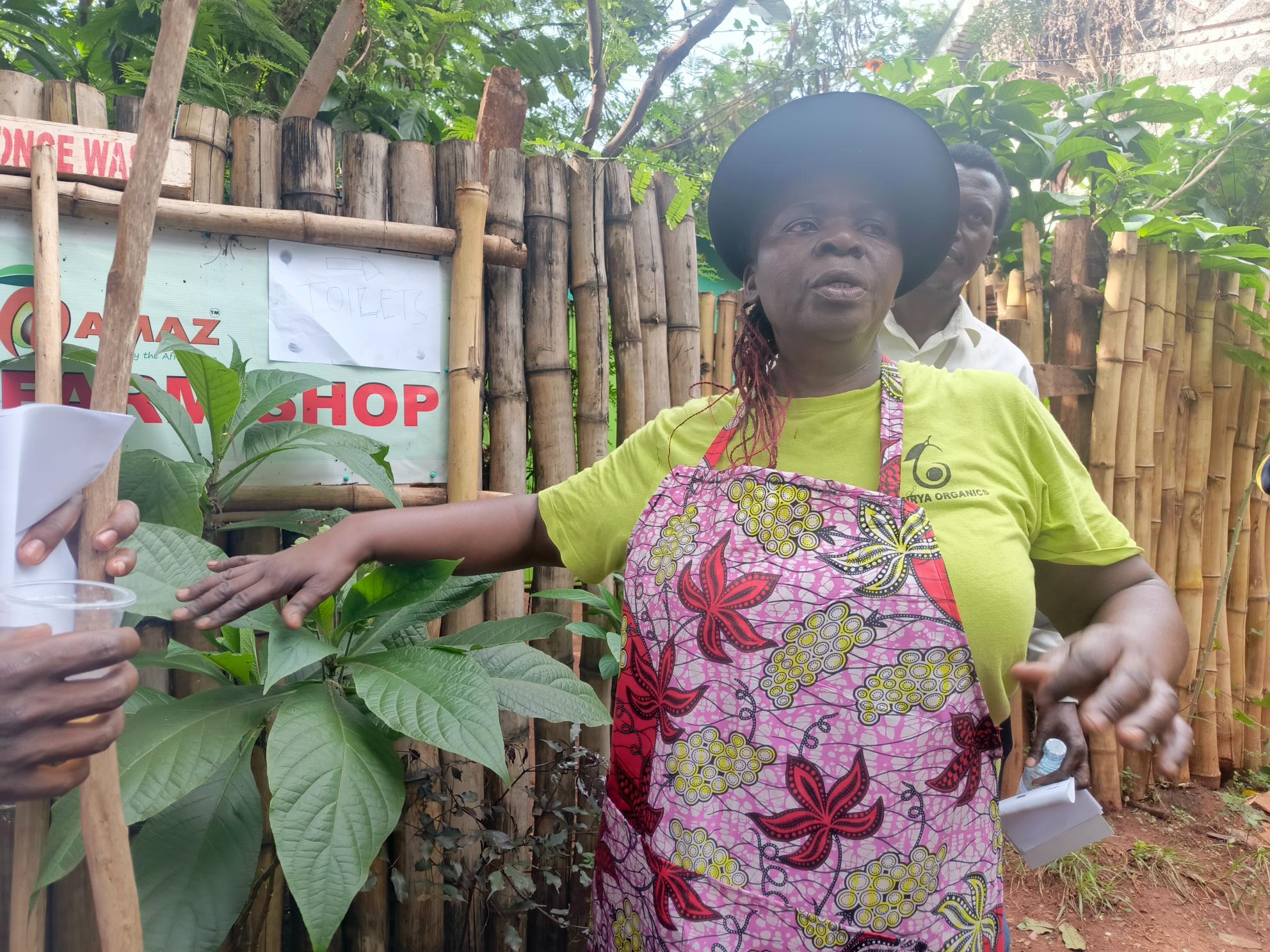
 Esther Naigembe
who manages the Maritimes Spices in Busaino Fruits and Herbs centre in Jinja, Uganda /AGATHA NGOTHO.
Esther Naigembe
who manages the Maritimes Spices in Busaino Fruits and Herbs centre in Jinja, Uganda /AGATHA NGOTHO. As sustainable agriculture is debated, one farm on the Uganda-Kenyan border provides a practical and lucrative demonstration of what working with nature can look like.
The farm is in Jinja, Uganda, on the border with Kenya.
Busaino Fruits and Herbs has adopted a forest garden approach that integrates fruit trees, medicinal herbs, livestock and agro-processing — while creating jobs for women and young people.
At Busaino in Wanyange, Jinja, in eastern Uganda, the farm looks less like a plantation and more like a thriving forest.
Judith Bakiria, the managing director of Busaino, says this woodsy approach is intentional. The enterprise is built around a forest garden agroecology model in which fruits, trees and herbs are grown together to mimic a natural ecosystem.
“We integrate fruits, trees and herbs in one garden,” Bakiria said. “We grow avocado, jackfruit and mangoes, and we add value to these. We also grow herbs, many occurring naturally. Because of that diversity, we produce wellness products from what we grow.”
Some of the processed products, she said, are marketed for reducing blood pressure, helping those with diabetes and ulcers, supporting hormonal balance and prostate health. She said the claims are based on local, traditional knowledge.
One flagship product is processed jackfruit. The farm exports jackfruit products to the Netherlands, while some of the processing occurs across the border in Nakuru.
“Every week, we process up to 20,000kg of jackfruit,” she said. “A kilogramme of processed jackfruit goes for about $10 (Sh1,292).”

Judith Bakiria, the managing director, Fruits and Herbs in Jinja, Uganda, explains about the forest garden agroecology model, where fruits, trees and herbs are grown naturally /AGATHA NGOTHO
While most Ugandans enjoy ripe jackfruit as a snack, Busaino is popularising tender jackfruit as a meat alternative.
“It makes a nutritious sauce in just 20 minutes. It is fibrous, affordable and very filling. We are teaching communities how to prepare and use it,” Bakiria said.
She said jackfruit is nutrient-dense, rich in vitamins, natural sugars and fibre. The seeds, once considered waste, are now processed into gluten-free flour suitable for children, lactating mothers and people avoiding wheat.
The forest garden concept, Bakiria said, was inspired by permaculture principles.
“We wanted to work with nature, just like a natural forest that gives us food, medicine and other resources without destroying the land,” she said.
She added that women play a central role in the business. They collect herbs, carry out primary processing, and supply the enterprise.
“Whenever someone buys our products, they are supporting women’s
incomes.”
The farm also partners with vocational colleges. Every year, at
least 10 agriculture and food processing students are trained on the farm; five
are retained permanently.
The farm is expected to expand into biofertiliser production using organic waste and become a livestock integration, agro-tourism and farm-based learning centre.
“We want Busaino to be a place where people come to learn, relax and reconnect with nature,” Bakiria said.
Esther Naigembe manages the spices enterprise within Busaino. This section grows and processes organic black pepper, rosemary, oregano, mint, lemon balm, lavender and other plants.
“We started seven years ago to empower women, especially widows,” Naigembe said.
Their spice brand, Maritimes Spices, sells in supermarkets and local markets, and the team hopes to expand exports. The spices are marketed as both culinary ingredients and wellness supports, especially for people with lifestyle-related health issues.
However, Naigembe said major challenges are high tariffs, export certification requirements, and lack of large-scale processing equipment.
“If we get commercial machinery, we can employ more than 200 youths and women,” she said. “We want our community to grow with us.”
The Jinja fruits and herbs centre in October hosted delegates from Uganda, Kenya, Tanzania, Rwanda, Burundi, the Democratic Republic of the Congo and South Sudan, during a regional agroecology meeting.
Million Baley, general coordinator of the Alliance for Food Sovereignty in Africa (AFSA), said while farmers face hurdles, such as certification challenges and industrial agriculture dominance, there is increasing political will to support agroecology in the region.
The regional meeting organised by AFSA aimed to strengthen cross-border trade in agroecological products.
Stakeholders called for removal of non-tariff trade barriers, establishment of dedicated agroecology marketplaces and investment in storage and transport. They also called or harmonisation of certification and standards in the region.



















